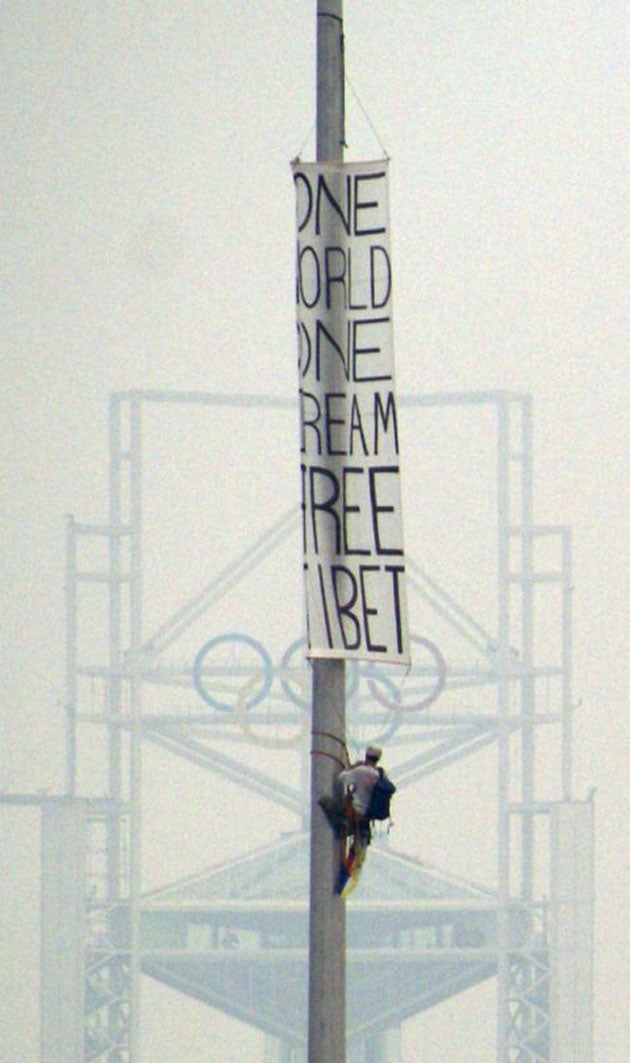Britons brave China's wrath to stage protest about Tibet

The Olympic torch arrived in Beijing to a frenetic welcome from flag-waving crowds, two days before the official start of the Games, but two Britons managed to breach the tight security cordon to unfurl a Tibetan independence banner and were promptly arrested.
Lucy Fairbrother, 23, and Iain Thom, 24, both members of the Students for a Free Tibet (SFT) campaign group, managed to climb an electricity pylon and unfurl two giant banners in the shadow of the Bird's Nest stadium. They were accompanied by two Americans who are also members of the organisation.
These Olympic Games are supposed to showcase China's remarkable advances during three decades of economic reform, and to give the world the impression of a modernising superpower that will come to dominate regional and, ultimately, global politics. But in the run-up, China has failed to shake off controversies over its human rights record and its unwillingness to become less authoritarian, as it promised the International Olympic Committee it would seven years ago when it won the rights to stage the world's biggest sporting spectacle.
"We did this action today to highlight the Chinese government's use of the Beijing Olympics as a propaganda tool," said Mr Thom in a message on the SFT's website.
It was always on the cards that activists would use the Games to raise awareness of a host of issues on which human rights groups have criticised China, ranging from its rule of Tibet, the arrests of dissidents, internet censorship and gripes about Chinese foreign policy.
Yet, given the security clampdown in recent weeks, ramped up since Xinjiang separatists attacked a police station and killed 16 officers at the beginning of the week, it was hard to predict how the activists would make their message known. China has made it difficult for even normal tourists to gain access, so it seemed unlikely activists would make it through the net.
But they did so in eye-catching fashion. The banners read "One World, One Dream: Free Tibet" in English and "Tibet Will Be Free" in Chinese. Police arrived at the scene after 12 minutes, according to the state-run news agency Xinhua, but the protest group said the banners were aloft for an hour before being ripped down.
Sun Weide, a Beijing Games spokesman, said his country has rules on "assemblies" and expects foreigners to respect them. The four protesters have been ordered to leave China by an unspecified deadline. There were reports last night they had been released and they are expected to be gone by tomorrow.
Ms Fairbrother's family said it appeared an online blog about a visit she made to Tibet in 2005 had been altered by someone trying to suggest she had changed her views about China. "I admit I have been under much influence of militant Free Tibet organisations back home. What China is doing now, and what China HAS done, are so different and I am angry with myself for not realising the distinction before now."
Her mother Linda saidshe had read the original posting and the sentiment and writing style did not sound like her daughter.
Tiananmen Square was also the focus for a small-scale protest by three Americans denouncing China's population control. "End the brutality," one shouted on the square, the city's symbolic heart. "To those who are forced to go through forced abortions and have no voice, we are your voice." Police hustled them off the square.
Away from the demonstrations, the atmosphere in Beijing was jubilant, with the arrival of the Olympic torch prompting the kind of outpouring of national pride not seen in China for a long time. The flame has been on an 87,000-mile journey to its final destination, dogged by protests in the wake of China's crackdown on Tibetan riots in March, and overshadowed by the devastating quake that shook Sichuan in May. But spectators lining the home straight were euphoric, "Go China, Go Olympics, Go Beijing," the masses shouted.
The basketball superstar Yao Ming, the tallest man in the National Basketball Association, towered above crowds of well-wishers in front of the Forbidden City on Tiananmen Square as he took the torch, while China's first man in space, Yang Liwei also ran a section of the relay.
Pollution was also back to welcome the torch. After days of clear weather, fears of a smoggy Olympics resurfaced. There was controversy when four US cyclists arrived in Beijing wearing face masks, much to the embarrassment of their hosts – especially as they were not even supposed to participate in outdoor events – and the athletes later apologised.
However, the haze over Beijing is a worry, despite what meteorologists are saying about it being in the "fairly good" range. All hopes are pinned on a big wind from the south blowing the yellow-tinged clouds away by tomorrow.
Iain Thom
Mr Thom, 24, lives in Edinburgh. He became interested in Tibet at university, and visited the region after graduating.
As well as being a keen member of the SFT, he is in the Scottish Parliament's Cross-Party Group on Tibet. He is on leave of absence from Friends of the Earth Scotland, where he is an environmental justice project officer. In a statement made during the protest, he accused the Chinese government of "using the Olympics to whitewash their human rights record on Tibet".
Lucy Fairbrother
Ms Fairbrother, 23, is from Cambridge but lives in London. She became involved with the Students for a Free Tibet group after visiting Tibet in 2003, later becoming president of its branch at Bristol University. Since graduating she has taken part in several demonstrations in Britain. Her father was a director of Barings Bank and is now senior bursar at Trinity College, Cambridge. Her mother is a presenter for Anglia TV.
Join our commenting forum
Join thought-provoking conversations, follow other Independent readers and see their replies
Comments
Bookmark popover
Removed from bookmarks